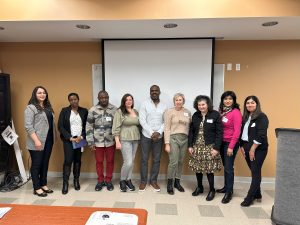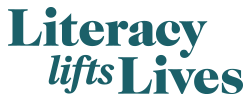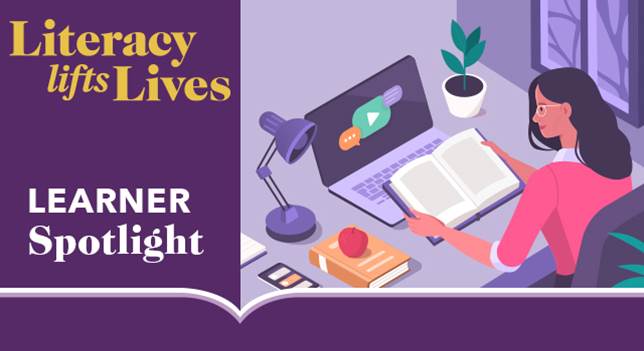Learner Spotlight: Literacy Council and Phoenix Mecano: Partners in Building Excellence
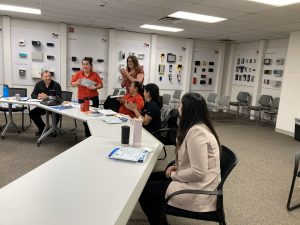 The Literacy Council of Frederick County’s Workplace Literacy Program formally began in 2016 and has been a game-changer, helping people employed in area hospitality-service businesses improve their English-language proficiency. Its success has been recognized with awards and grants from business and government leaders. And in January, the Council brought to fruition another goal for this ambitious and innovative program: Meeting the needs of businesses outside the hospitality arena. Which is why, earlier this month, a class of five students began their second 9-week workplace literacy session held at the Frederick headquarters of Phoenix Mecano, a manufacturer of customized encasements for electrical components.
The Literacy Council of Frederick County’s Workplace Literacy Program formally began in 2016 and has been a game-changer, helping people employed in area hospitality-service businesses improve their English-language proficiency. Its success has been recognized with awards and grants from business and government leaders. And in January, the Council brought to fruition another goal for this ambitious and innovative program: Meeting the needs of businesses outside the hospitality arena. Which is why, earlier this month, a class of five students began their second 9-week workplace literacy session held at the Frederick headquarters of Phoenix Mecano, a manufacturer of customized encasements for electrical components.
The partnership began in January, says the Literacy Council’s Community Outreach Coordinator Andrea Ormsby. She describes how, in discussions with the company’s director of engineering about the workplace program, the executive “was excited to learn about it. She saw how the program would benefit employees by helping them to better understand safety specifications and more efficient ways of using certain machinery.”
The company had never offered its employees this kind of English-language workplace program and was open to the idea of trying it. “They were able to identify at least five employees who could specifically benefit from participation”—and they were eager to enlist the Council’s service on their behalf.
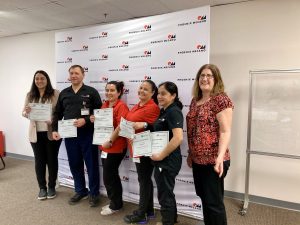 “The company culture is very invested in supporting their employees,” says Ormsby. “They look at a program like this as another kind of professional development that you would provide to an English speaker trying to increase their skills. This falls right in line with Phoenix Mecano’s culture of supporting their employees from day one.” In fact, one of the students who is in the class is an intern who literally began working at Phoenix Mecano the same week the Council started the program there. “They were totally fine with her taking the class with the regular employees. And she has been participating in it ever since.”
“The company culture is very invested in supporting their employees,” says Ormsby. “They look at a program like this as another kind of professional development that you would provide to an English speaker trying to increase their skills. This falls right in line with Phoenix Mecano’s culture of supporting their employees from day one.” In fact, one of the students who is in the class is an intern who literally began working at Phoenix Mecano the same week the Council started the program there. “They were totally fine with her taking the class with the regular employees. And she has been participating in it ever since.”
The process of creating a curriculum for the prospective students—a mix of native Spanish speakers and a Russian speaker— required some fine-tuning, says Workplace Literacy Coordinator Anna Maestri. “All of them tested at different levels of proficiency, from low-beginner to high-beginner. So, we decided to create a multilevel class,” which called for some adjustments to suit the students’ needs, Maestri says. “We had one nstructor in mind who had a lot of experience working with multilevel students. I reached out to her, and luckily, she was up to the challenge.”
Given the technical nature of most jobs at Phoenix Mecano, Maestri says that they worked with the Human Resources manager “to find out how best to tailor the classes—should we focus, for example, on technical terms, or create a broader standard curriculum?” As it turns out, the company didn’t insist that class instruction focus solely on material suitable only for use in the workplace environment. “They wanted to be sure the curriculum included [English vocabulary] that would be applicable to students’ lives outside work and helpful in other areas like healthcare, school, family.”
Maestri explains that instruction was supplemented with relevant terms gleaned from documents they requested from the company, such as spreadsheets containing technical terms their employees would use. This kind of hesitation, Ormsby says, is something that comes up often in dealing with adult learners: Overcoming a reluctance to admit that there is a limitation that could be addressed by taking a class.
Ultimately, Ormsby’s and Maestri’s hard work paid off. A self-evaluation survey the students took after the nine-week winter session showed that “the students already felt more comfortable and confident using English. And they all indicated interest in continuing in the second session,” Maestri says. Ormsby adds that during the standard debrief meeting following the first session, she heard that the students said they were feeling more confident in their positions. “We were told that one of the employees, who would never come to Human Resources to ask questions, had actually started coming!” It was evidence of the confidence the student had already acquired in conversing in English. “Another employee shared that she was becoming more confident in going to her child’s school and having conversations with teachers, without needing someone to translate.”
This is what Tara Julian, Human Resources Manager at Phoenix Mecano, had to say regarding how she feels the literacy classes are going:
“The Literacy Council classes have been very well received. The students love the trainer and are excited to continue! At Phoenix Mecano we believe that education sponsored during work is important. We are investing in our people and removing the barriers someone may have scheduling a class at a different time. It is wonderful to see the personal growth in each student! Employees say the English class has helped at work, their children’s school and out in the community. We are thankful to have the Literacy Council as a partner!”
Discussion is underway about the next class and what it will look like, says Maestri. “But before that, Phoenix Mecano plans to recognize the students’ accomplishments with a celebration at the end of the second semester.”
“Receiving those positive testimonies after only nine weeks was remarkable,” says Ormsby. “And it is why the Literacy Council hopes to continue expanding and connecting with other companies, and reaching people whose lives might also be enriched by a program like Workplace Literacy. This is why we do what we do. This is what we always want to hear.”
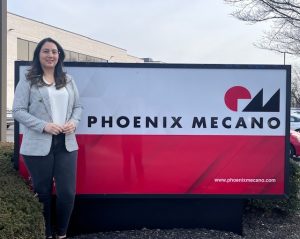
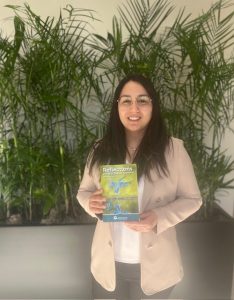 The Literacy Council’s adult learners often participate in more than one literacy program. For example, one of the company’s employees, Kaliopys, contributed to the Literacy Council’s most recent edition of its literary magazine, Reflections – Voices of English Learners. Student authors, including Kaliopys, were invited to read from their newly-published work at the edition’s Reflections launch event at The Frederick News-Post.
The Literacy Council’s adult learners often participate in more than one literacy program. For example, one of the company’s employees, Kaliopys, contributed to the Literacy Council’s most recent edition of its literary magazine, Reflections – Voices of English Learners. Student authors, including Kaliopys, were invited to read from their newly-published work at the edition’s Reflections launch event at The Frederick News-Post.
